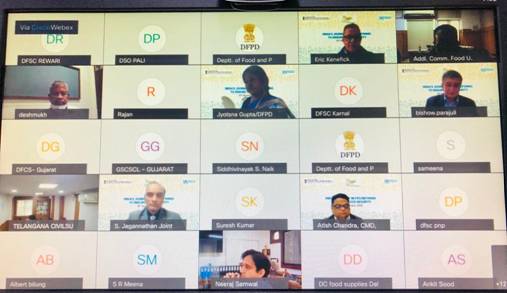‘Azadi Ka Amrit Mahotsav’, the celebration and commemoration of 75 years of progressive India and its glorious history began on Monday organised by the Department of Food and Public Distribution (DFPD) under Ministry of Consumer Affairs, Food and Public Distribution.
On the first day of the celebration, the Department together with United Nations World Food Programme, its longstanding partner in PDS reforms, organised a webinar on ‘India’s journey in PDS Reforms to ensure Food Security’. High level experts participated in the webinar and deliberated upon the Journey of technology based PDS reforms in India, India’s experience in ensuring food-security during COVID-19 crisis, Supply chain reforms & innovations for addressing food wastage and storage losses and Role of Operations Research, Artificial intelligence, and other new technologies in transformation of TPDS.
India has a long history of Public Distribution system (PDS) that can be traced back to ‘food grain rationing’ implemented in pre-independence India, the period, that is still remembered for the large-scale deaths & human sufferings due to mass famines & hunger. After Independence, India has successfully pushed the mass famines into the pages of history and has made significant progress in addressing food insecurity, under-nutrition and poverty through its development policies related to food and agriculture with Public Distribution System being at the centre-stage.
“In late 70s and 80s, the public distribution expanded to rural areas, following which Targeted PDS was launched in 1997 and implementation of landmark National Food Security Act (NFSA) was completed in 2016,” said S. Jagannathan, Joint Secretary, DoFPD while talking about ‘Journey of technology based PDS reforms in India and its impact.’
He added, “As the nation is celebrating Azadi Ka Amrit Mahotsav, Targeted Public Distribution System (TPDS) has evolved as a highly transparent and robust foodgrain delivery mechanism due to various technology based reforms taken up by the Government of India during last 6-7 years under the National Food security Act (NFSA) 2013. The implementation of ‘One Nation One Ration Card’ (ONORC) Plan in 34 States/UTs has further brought about seamless portability of ration for NFSA beneficiaries, especially migrant beneficiaries. The resilience and robustness of the TPDS was demonstrated well during COVID 19 crisis, when despite severe obstacles, nearly 600 LMT of additional Foodgrains worth over Rs. 2 Lakh Crore were allocated in 2020 and 2021 for 15 months to over 80 crore beneficiaries and the country stood out as shining example of food security during these testing times.”
Bishow Parajuli, Country Director, UNWFP India talked about ‘India’s experience in ensuring food-security during COVID-19 crisis’. He applauded India’s response to the pandemic not only in terms of health care but also in PDS.
“India has made tremendous progress in food production through Green Revolution & food security by improving access to food through schemes like Mid Day Meal, Integrated Child Development Scheme and others. The country offers a global lesson,” he said.
“The journey of India’s 75 years of Independence and its progress towards food security is inspirational. The country has made great progress over the years on all three counts: food production by achieving self-sufficiency, reducing malnutrition, initiating promising models for resilient and sustainable livelihoods, and inclusion through the food safety net. The quick and comprehensive response during COVID-19 offers global lessons. We must continue focusing on ‘equity, inclusion, and access by addressing the exclusion and vulnerabilities of marginalized groups. There is still concern around stunting; wasting, and a high prevalence of anaemia and micronutrient deficiency disorders. The recent announcements by the Prime Minister, such as mandatory fortification of rice, One Nation One Ration Card, and Poshan plus, will hopefully address concerns around nutrition,” he added.
Atish Chandra, CMD FCI talked about Supply chain reforms & innovations for further addressing food wastage and storage losses and informed that there are nearly 22,000 godowns with Food Corporation of India while an additional 12,000 godowns are run by states.
Prof. S.G. Deshmukh, HoD, Mechanical Engineering, IIT Delhi while talking about Role of Operations Research, Artificial intelligence, and other new technologies in transformation of TPDS said that PDS plays a vital role in eradicating poverty and eliminating hunger.
The policy package comprising of green revolution, procurement of Food grains at minimum support price from farmers and buffer stock policy etc. made it feasible to successfully transform a famine ridden food grain-deficit country to a food grain-surplus & net-food grain exporting country. These policies also allowed for progressive expansion of food safety net entitlements/ coverage, putting the country in a unique position to confer highly subsidised food grains as legal entitlements to more than 80 Crore people in India through National Food Security Act.
Further, the technology based PDS reforms have silently transformed the manually operated system into a highly transparent automated system, that enables dignified & fool-proof access of adequate food grains to the most vulnerable beneficiaries throughout the year. The resilience & robustness of the food system in India, comprising of PDS, was truly visible during the COVID-19 pandemic led crisis. Today, India’s food security response to COVID-19 crisis is being globally recognised as a shining example for its unparalleled speed, scale & transparency.
The quest for continuous reforms has prompted the Government to initiate game-changing policy initiatives, such as supply of fortified rice through Public Distribution System to address malnutrition & implementation of portability facility for ensuring fool- proof access of PDS entitlements to migrant beneficiaries from any Fair Price Shop in the Country. Challenges such as malnutrition & food wastage/ storage losses are also being further addressed through holistic policy approach.




